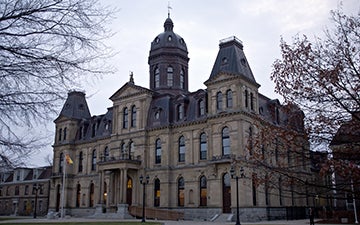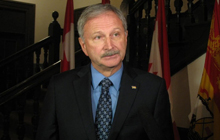New Brunswick: 'Change is needed' – Consultations begin on province's high property taxes

The new Liberal provincial government has frozen property taxes as it follows through with a campaign promise of tax reform currently in the discovery phase
FREDERICTON, July 8, 2025 – Jacqueline Carr will talk your ear off about New Brunswick's high property taxes.
The homeowner in downtown Fredericton has seen her assessment rise each year by 10 per cent, the maximum allowed under the provincial government's spike protection, which she considers little protection at all.
The high taxes prevent her and her husband from selling their home and buying a different property. She has used Service New Brunswick's online property assessment tool to see the taxation jump once home sales go through.
"We can't afford our property taxes right now," she told Brunswick News.
"They go up 10 per cent every year, and that's an incredible increase. We would like a house that serves us better. Even though prices are high — and that means we could sell our house for a good price — the second you move, there's a bit of a grace period, and then the assessment shoots up. The spike protection goes and suddenly you can't afford the property tax."
Carr is one of many New Brunswickers who are fed up with high property taxes, an issue that isn't lost on the Holt Liberal government.
It promised during the provincial election campaign last year to review the system.
Last week, it announced it would give people a little over a month to have their say on property tax reforms.
In a news release, the Department of Finance and Treasury Board invited New Brunswickers to participate in a public survey on the topic, which takes about 10 minutes to complete and is available online or over the phone until Aug. 10.
"Change is needed," said Finance Minister René Legacy in a prepared statement.
"New Brunswickers want and deserve a property tax system that is transparent and provides fairness and stability moving forward. This overhaul is intended to support a long-term transformation that is sorely needed."
The new government laid the groundwork for reform by passing a law in June providing some relief to property owners.
For the 2026 taxation year, eligible properties will have their taxation value frozen at the 2025 level. This includes residential owner-occupied and non-owner-occupied properties, and non-residential properties, including heavy industrial properties.
On top of that, the equalized payment plan has been expanded to give more property owners the option of paying their property taxes in monthly instalments.
But Legacy told reporters earlier this year that the special measures would simply set the table for bigger reforms to come.
Over the past four years, New Brunswick has had record growth in its real estate market. This increase in sales prices has led to higher property taxes for many people, especially homeowners.
Carr, who previously lived in Toronto, Vancouver and Nelson, B.C., says she keeps an eye on property taxes across the country. New Brunswick's are among the highest, even though properties are far pricier out west and in Central Canada.
"The property tax assessment in New Brunswick is insane," she said. "Our house in Nelson, B.C., even at its current value — it just sold for $800,000 — they're paying one-third of what we're paying in taxes. Our house here isn't worth nearly as much."
She also has friends who live in Markham, Ont., near Toronto.
"They have a $2-million home, and they are paying half of what we're paying in property taxes. Now, I understand our small population plays a huge role in this because there are fewer people to pay for public services; however, we don't have transparency. We don't understand why the taxes are going up so much."
As part of a slew of affordability measures, Premier Susan Holt promised a big overhaul of the property tax system.
Thanks to spike protection introduced by the province in 2013, some values have become distorted, with certain homeowners paying more taxes for the same value house. The difference can be hundreds of dollars in extra taxes a year.
The protection limits the increase in a property's assessed value for taxation to a maximum of 10 per cent annually, even if provincial assessors say the property value is higher.
But it also has limitations. Ineligible properties include those with new construction or major improvements, those that have been recently sold, and vacant land.
As part of what the provincial government is calling a "discovery process," it promises to consult with stakeholders about tax reform by the end of August.
David Kelly, a departmental spokesman, told Brunswick News an advisory committee of representatives from municipal associations, local government leaders, senior municipal employees and provincial government staff would provide guidance and insight throughout the entire project.
The key stakeholder groups include representatives of local governments, residential, industrial and commercial property owners, developers and builders, renters, farmers and private woodlot owners, businesses, housing advocates, non-governmental organizations, academics and different provincial government departments.
"This is a comprehensive engagement process, and we encourage all interested individuals and organizations to provide their feedback," he wrote in an email.
On its citizen engagement and public consultation page online, the government pledged to prepare reports "on what we heard and learned that will be shared with stakeholders and the public."
In the "solutions-building" phase between August and December, the government stated it would engage stakeholders further, evaluate various options and provide recommendations for a final decision.
John Chilibeck is a Local Journalism Initiative Reporter with The Daily Gleaner in Fredericton, New Brunswick. Title image: New Brunswick Legislature by Breau is licensed under CC BY-SA 4.0.







(0) Comments